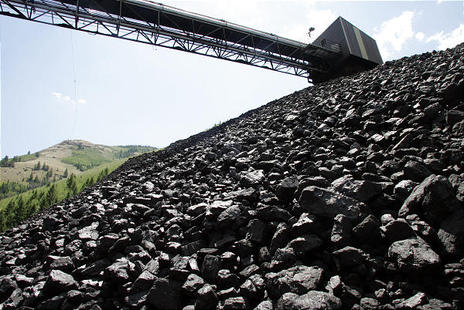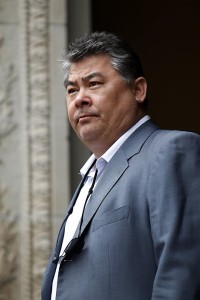Tagami’s New Deal to Bring Coal to Oakland Draws Opposition
May 9, 2015
Posted in Community, Economic Development, Environment, Politics, Responsive Government

By Ashley Chambers
Now that the Oakland Army Base development project is well underway, city developer and project manager Phil Tagami is working on a behind-the-scenes $53 million deal to ship coal from Utah through the new Oakland trade and logistics.
Last year local residents spoke out, and the City Council and the Port of Oakland have voted not to allow coal to be shipped through the port.
The Utah Permanent Community Impact Fund Board last month approved funding that would allow four counties in the state to acquire interest in the port in Oakland, according to The Richfield Reaper.
Utah is the14th largest producer of coal in the U.S.
The coal would be exported as soon as summer 2017 through a terminal at the Army Base that is expected to begin construction later this year. The new Oakland Bulk and Oversized Terminal will be designed to transport “bulk commodities” including iron ore and oversized equipment.

While the deal is still being negotiated, according to reports, the project is Tagami’s deal and has remained off the city’s radar until recently.
Tagami said his seven years of securing approvals and environmental entitlements for the Oakland Army Base project allow him to “lease space to a private company that can export just about anything except ‘nuclear waste, illegal immigrants, weapons and drugs,’” as reported in the Contra Costa Times.
However, according to a number of residents, bringing coal into the city could jeopardize everything that community residents and activists have fought for in massive Army Base development project – among them, clean energy and reduced environmental impacts on the West Oakland community adjacent to the port and to the city in general..
“This (Army Base) is city property, and at least half of the total investments are public money,” said Brian Beveridge of the West Oakland Environmental Indicators Project (WOEIP) and resident of Oakland. “Ultimately, Tagami and his group is a tenant of the City of Oakland; they don’t own the land.”
There are two core local environmental impacts, said Beveridge – “hundreds of pounds of coal dust emissions in the area, with 150 to 850 pounds of coal dust lost in transit.”
Secondly, “Oakland has a greenhouse gas reduction plan. Everything we’ll have gathered will be lost” by buying and exporting coal into the city, he said.
“Coal is one of the worst greenhouse gas producers in the world,” Beveridge added.
Oakland Mayor Libby Schaaf has also voiced her opposition to the export of coal in the city, voting last in May as a councilmember in support of a resolution against the transport of fossil fuels through the city.
Although Utah has already approved funding, winning support for the deal in Oakland is likely to be a hard sell.
According to the Sierra Club, the nation’s largest grassroots environmental organization, coal burning is responsible for one-third of U.S. carbon emissions and leads to as many as 13,000 premature deaths every year and more than $100 billion in annual health costs.
In 2013, Tagami told Sierra Club leaders that there was no way he would consider coal as a commodity, according to Michelle Myers, director of the Sierra Club San Francisco Bay Chapter.
Myers suggested that the city amend the development agreement to allow them greater oversight on Tagami’s role as project manager and developer on the project.
“(Councilmembers) clearly expressed that they don’t want this type of commodity coming through the community, but they don’t have the legal levers to prevent it,” she said. “This is public land. They could potentially repeal his authority.”
Added Beveridge, “The city needs to define more clearly what kind of action and activities are appropriate to happen on their public land.”
“We have to connect our world-view to our local view, and exporting coal is a disconnect,” he said.